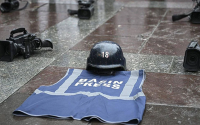30 October 2008
We've got so used to the idea, it's easy to discount it. But if Barack Obama is elected US president on Tuesday, the symbolic impact at least can hardly be overestimated. Most obvious is the racial dimension. The election of an African-American to the most powerful job in the world by a society built on slavery, discrimination and ethnic cleansing cannot but have far-reaching cultural repercussions, both in America and across the globe. Throughout the US, it will surely be a moment of catharsis in a country barely a generation away from the struggle over segregation and civil rights.
Then there will be profound national and global relief at the end of the eight-year reign of the Bushite Republicans, with their wars of bloody conquest, kidnapping and torture, and reckless featherbedding of the corporate oligarchy at the expense of ordinary Americans. This week's attack on yet another sovereign state, Syria, is a reminder, if any were needed, of the swaggering militarism which has marked the Bush-Cheney regime.
Add to that the charismatic appeal of a Kennedy-style liberal, and the ingredients for an outpouring of popular enthusiasm at home and an extended political honeymoon abroad are all in place. In the wake of seven disastrous years of the war on terror, the US political system will be seen to have renewed itself and earned a generous measure of international goodwill towards the latest holder of that bogus, unelected title, "leader of the free world".
If, on the other hand, John McCain were to confound weeks of opinion polls and win the day, the backlash would surely be harsh. Against a background of intense Republican unpopularity, economic crisis and apparently impregnable polling leads, such a victory would be widely seen as the product of shameless racism - and the election as rigged and stolen. In the US, anger could be expected to turn to rioting. Across the rest of the world, America's popularity and moral standing - already at a historic low - would sink to unprecedented depths. No wonder such a large part of the American establishment is rooting for an Obama win.
No politician, least of all one tied up by the constraints of the corporate-funded US presidential system, can hope to meet the kind of expectations that have been aroused among the Illinois senator's armies of enthusiasts, even if bolstered by a clean Democratic sweep in Congress. Political momentum can be sustained in the short term by emblematic decisions, such as the closure of the Guantánamo Bay internment camp and a start to the withdrawal of troops from Iraq. But it is the economic crisis that has powered Obama's campaign to this point, and despite a more populist agenda than Bill Clinton - including tax rises for those earning more than $250,000, Gordon Brown please note - the sort of measures needed to tackle ballooning unemployment, bankruptcies and repossessions are simply not on the table.
This is a country, after all, where real incomes for low and middle income earners have already been stagnating for years, 45 million people have no health insurance, black people make up nearly 40% of its world-beating 2.3 million prison population - and which, on the brink of a slump, is stuffing the pockets of bankers with $700bn without serious public controls. Obama's policy programme, as far as it goes, hardly begins to match the scale of the challenge, but already he is talking about cutting back planned programmes to pay for the crisis and the cost of the Iraq war.
The same goes for US foreign policy. After two terms of unilateralism and aggression, Obama's conciliatory tone, opposition to the Iraq war, support for dialogue with Iran, and apparent preference for "soft power" naturally seem like manna from heaven in the rest of the world. But look at the small print and continuity, rather than change, appears to be the order of the day. In Iraq, his proposal to withdraw combat troops in 16 months while maintaining bases and "counter-terror" forces is increasingly similar to Bush and McCain's own policy, as are his plans to escalate the war in Afghanistan and Pakistan as the "central front in the war on terror", and his hawkish line on conflicts from Colombia to Georgia.
So far there's no prospect of any fundamental shift in approach, as underlined by the number of Obama's advisers drafted in from the Clinton era. What he appears to be offering instead is some kind of imperialism with a human face - as he himself says, he wants a return to the "realistic policy" of George Bush senior, JFK, and "in some ways, Ronald Reagan". Some Obama supporters believe much of this is election positioning, and there have been quiet assurances to sympathisers around the world that plenty will be up for discussion in the aftermath of victory.
Of course, whoever the president, the US will remain a global colossus, with a military presence in 130 of the world's 195 countries. But it is also a power in unmistakable relative decline and an Obama presidency offers the US a breathing space to re-order its relations with the rest of the world accordingly. The benefit of the doubt that will be given to Obama in the early period of a new administration - in Europe that's likely to stretch to defence of the indefensible, as in the Clinton years - potentially gives the US extra room for manoeuvre. Economic failure may yet force military cutbacks, despite Obama's pledge to expand the armed forces. But, as in the domestic arena, if expectations of change are dashed, the reaction may end up being all the sharper.
What seems certain is that Obama's election will be a catalyst that creates political opportunities both at home and abroad. The Obama campaign grew out of popular opposition to the Iraq war and its success has been based on the mobilisation of supporters who will certainly want to go further and faster than their candidate. Economic conditions are also likely to demand a more decisive response. And even if conditions are very different from those which led to the New Deal of the 1930s - not least the lack of a powerful labour movement - Obama could yet, like Roosevelt, be propelled by events to adopt more radical positions. In any case, if Obama is to begin to fulfil the confidence invested in him, hope will not be enough - those who want real change will have to fight for it.






